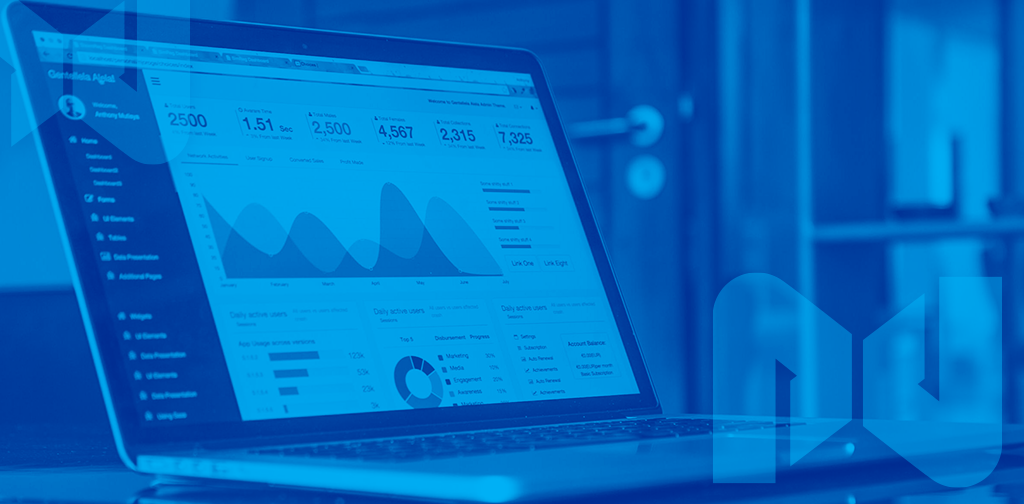Although there are many ecommerce analytics tools available, most people continue to associate ecommerce analytics tools with Google Analytics. While it’s the standard choice, that doesn’t mean it’s always the best choice for ecommerce data analytics.
Many of the most powerful ecommerce analytics tools are tailored for a specific facet of ecommerce including brand management, customer data, or something in-between.
If you are looking to supplement Google Analytics or replace it with another platform, our list of effective ecommerce analytics tools can help.
Keep reading for our top seven ecommerce analytics software recommendations.
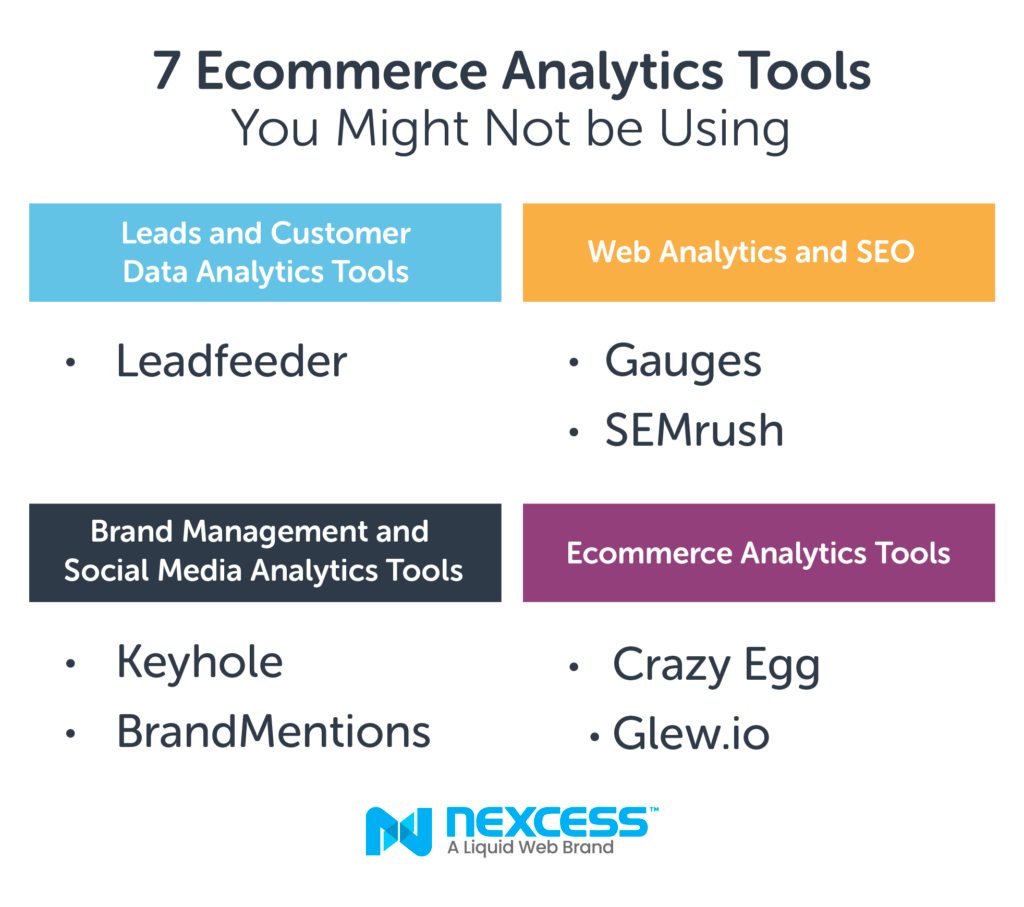
Ecommerce Analytics Tools for Lead & Customer Data
Customer acquisition and retention ultimately drive most ecommerce business decisions. More customers mean more sales which in turn means more revenue. For this reason, ecommerce analytics software that focuses on your leads and customer data (like Kissmetrics and Leadfeeder) can be central to your technology stack for your ecommerce business.
1. Leadfeeder
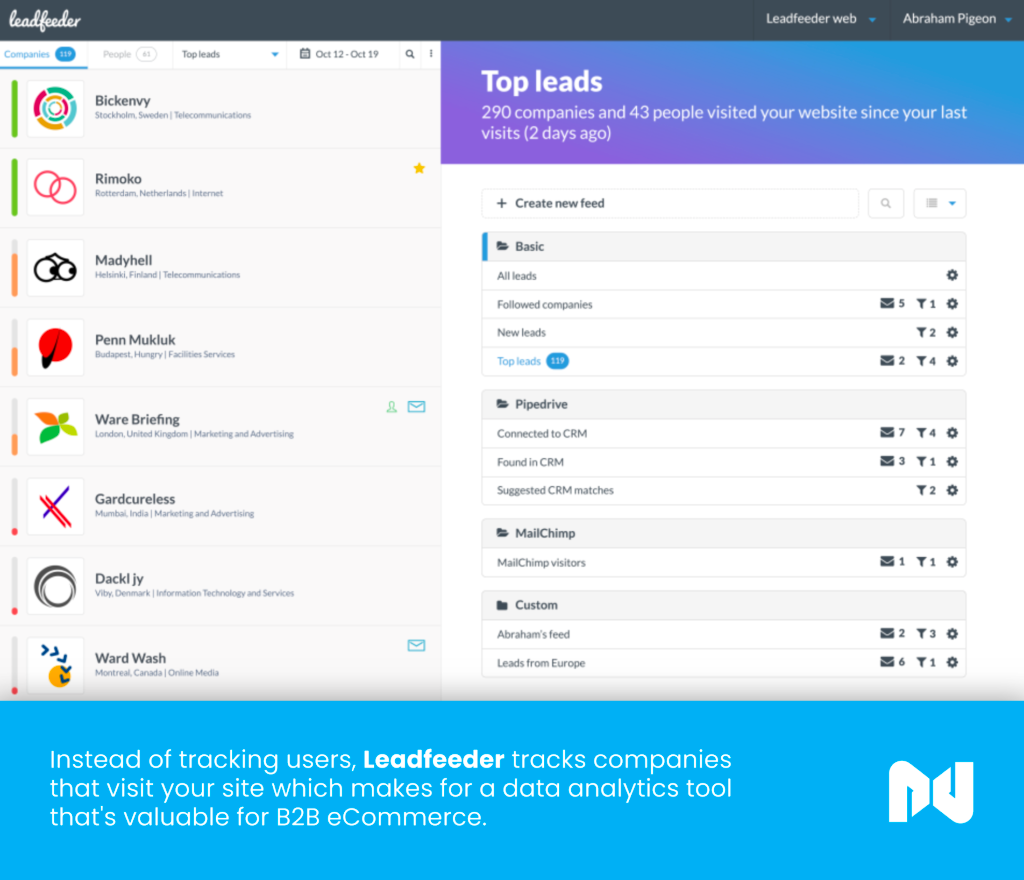
At first, the features seem narrow or limited in scope, but Leadfeeder is an ideal and comprehensive tool for many businesses. While other tools track pageviews and customer data, Leadfeeder actually tracks companies that are shopping an online store. This makes it an ideal analytics tool for ecommerce businesses in the B2B space.
Leadfeeder has deep integration with Google Analytics — potentially adding a new dimension to Google Analytics data. But Leadfeeder also works with popular customer relationship management (CRM) tools including WebCRM, Pipedrive, and Salesforce.
Besides tracking the companies that visit your ecommerce site, Leadfeeder has other compelling features. For example, you can select specific companies or organizations that you would especially like to convert and have Leadfeeder notify you by email whenever someone from one of those companies visits your site. This gives you the chance to follow-up and further warm a lead, making Leadfeeder an effective selling tool.
Cost: Variable. Lite version (up to 100 leads and 7-day history) is free. Premium version starts at $53 per-month.
Ecommerce Analytics Tool for Web Analytics and SEO
A core metric of web analytics is tracking movements. For example, who is visiting your site, how they are interacting with your site, and what brought them there in the first place. These data points and ecommerce KPIs provide important direction for your ecommerce business. The data will show you which keywords drive the most traffic and the value of your backlinking strategy for conversion.
2. Gauges
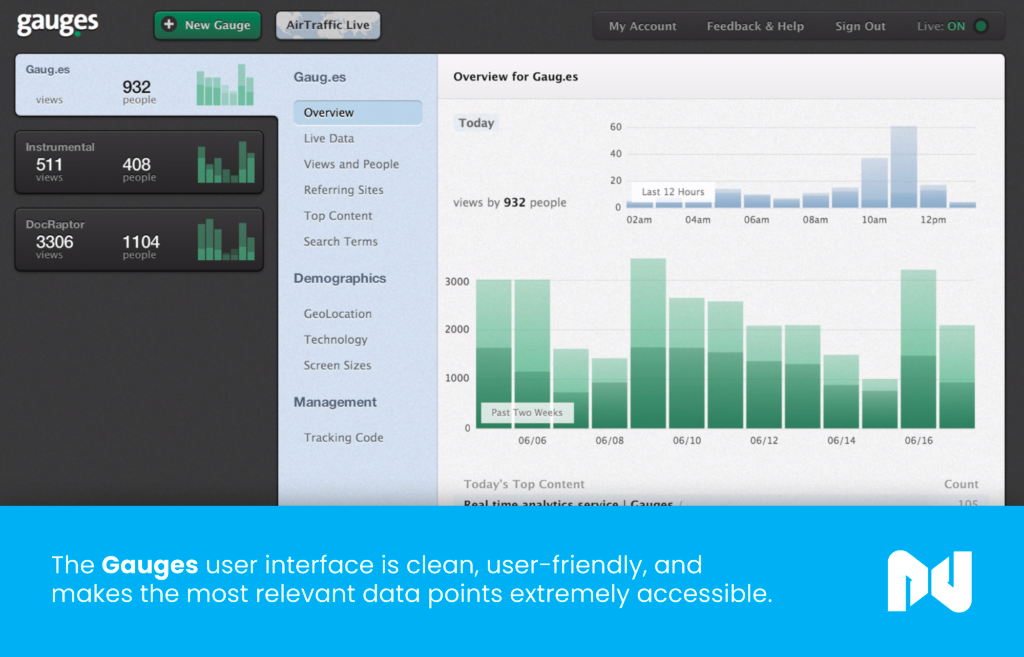
Gauges is an up-and-coming web data analytics tool that is most notable for providing real-time insight into the traffic that your ecommerce store is getting. The platform is also lauded for its clean, user-friendly interface that puts the most pertinent information front and center.
Gauges was designed to be flexible and highly scalable. Businesses of all sizes can benefit from its live data tracking capabilities. Business owners who use Gauges appreciate that there’s no delay between a pageview or other engagement event, and the data being reflected in the platform. Plus, Gauges offers you a “bird’s eye view” so you can see what someone who is currently on your site is seeing.
Besides live data, Gauges offers other features that are common among ecommerce analytics software for web data. These include keyword tracking, ecommerce conversion rate tracking, referral tracking, and campaign management.
The main drawback to Gauges is the thin integration support. However, even without official integration, Gauges is a very compact, non-invasive tool. It plays nicely with most other tools that you may be using simultaneously. Once you have a Gauges subscription, the platform allows you to install the tool on an unlimited number of websites that the tab-based interface keeps very organized and accessible.
Cost: Variable. Starts at $6 per-month for 100,000 pageviews. Offers a 14-day free trial.
3. SEMrush
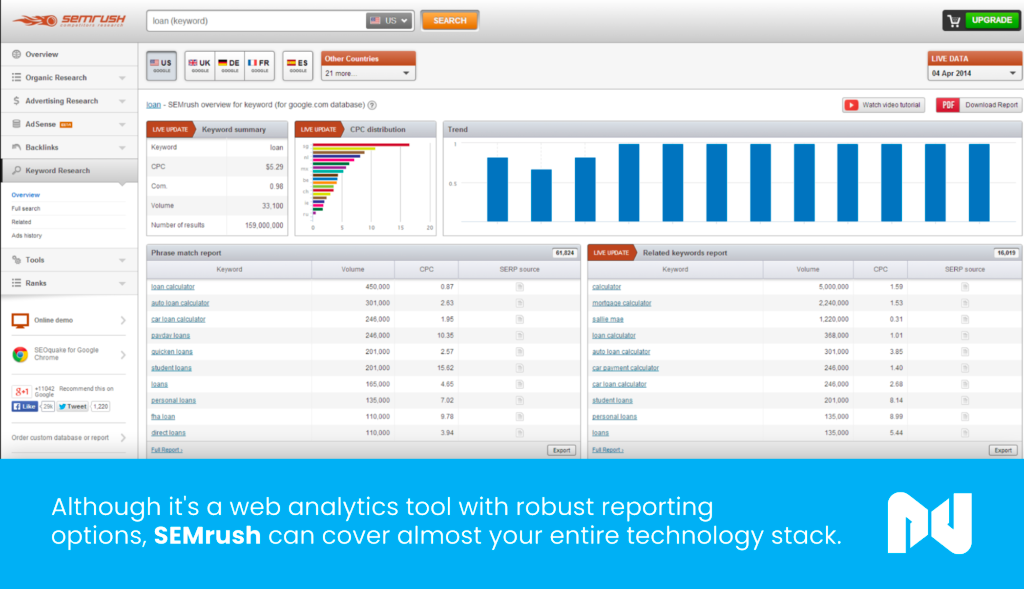
SEMrush is a very versatile analytics tool. In fact, its ability to cover nearly your entire ecommerce technology stack has made it one of the top data analytics tools outside of Google Analytics.
At its core, SEMrush is a robust SEO platform that is also a capable web analytics tool. For small and medium-sized ecommerce businesses, SEMrush is a popular choice for ecommerce SEO keyword tracking, search monitoring, and gathering important metrics like pageviews, referrals, and the performance of paid advertising campaigns. The platform also has some unique features including the ability to monitor your competitors, analyze the content on your site, audit your backlinks, and track what people are saying about your brand on social media.
SEMrush has a breadth of data visualization options, as well as the ability to customize your reports. For instance, you can have the graphs and charts on the main dashboard showing the performance of a handful of keywords that you’re trying to rank. So instead of forcing you into a certain view, SEMrush provides a variety of tools that you can use in whichever ways are best for your ecommerce business.
The downside to SEMrush is that there can be a bit of a learning curve, particularly with its somewhat complicated user interface. However, SEMrush does integrate with all the major social networks as well as WordPress, Trello, and virtually every cloud service Google offers. It’s no surprise that companies like eBay, PayPal, Forbes, and Wells Fargo are among SEMrush’s subscribers.
Cost: Variable. Starts at $99 per-month. Offers 7-day money back guarantee instead of a free trial.
Brand Management and Social Media Analytics Tools
For an ecommerce business, social media is an incredibly important marketing channel. In the absence of physical retail, social media is often the most effective way for ecommerce businesses to strengthen relationships with customers. As a result, social media analytics tools are core to rolling out a successful sales and marketing strategy.
4. Keyhole
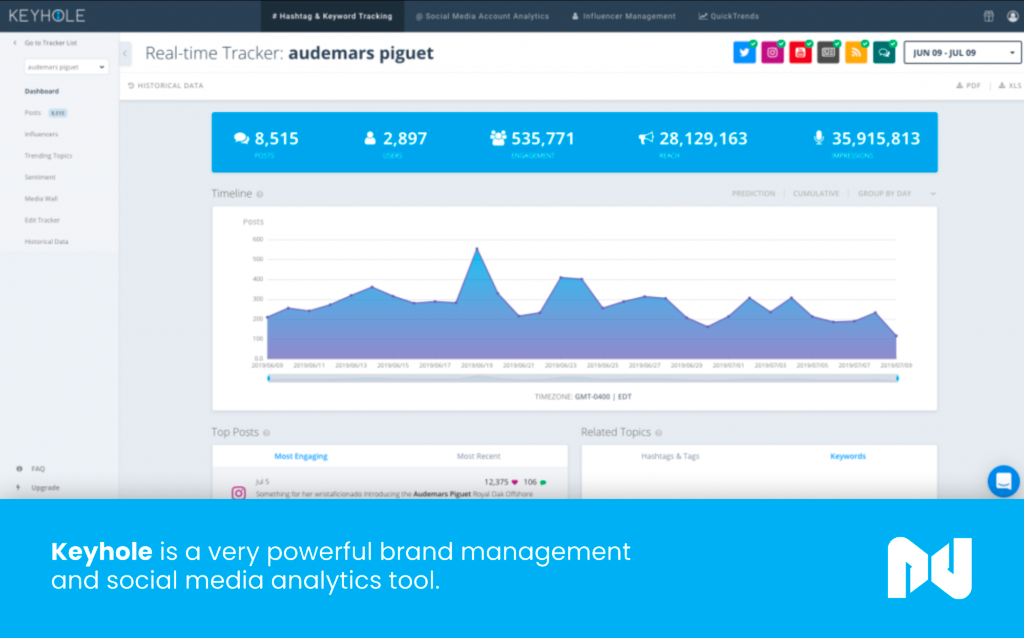
While many social media analytics tools track your brand, Keyhole is one of the most full featured tools in the market today. In fact, it largely makes up for the narrowness of its scope by offering impactful features like hashtag analytics and in-depth data tracking of your social media accounts.
As a brand management tool, Keyhole provides a complete picture of how your audience sees your brand. You can even track specific keywords or phrases. This is particularly useful when users don’t tag or mention your social media accounts in their posts. Keyhole also tracks your influencer marketing campaigns and social listening.
Related reading: How To Use Social Media as a Social Commerce Platform >>
You get full access to relevant engagement and conversion metrics for influencer content including estimates for your return on investment. There’s also versatility in reporting. You can filter and sort influencers based upon specific attributes like audience size and content engagement rates.
You can also schedule and publish your social media posts to save marketers 5+ hours every week on gathering and reporting data, which translates into over $7,000 saved every year. Businesses of any size can benefit from this effective social media analytics tool. Rather than choosing from the Twitter or Facebook analytics tools available, Keyhole integrates with all major social networks including YouTube, aggregating your mentions across all of these popular platforms in one central dashboard.
Cost: Variable. Starts at $26 per-month (billed annually). Offers a 7-day free trial.
5. BrandMentions
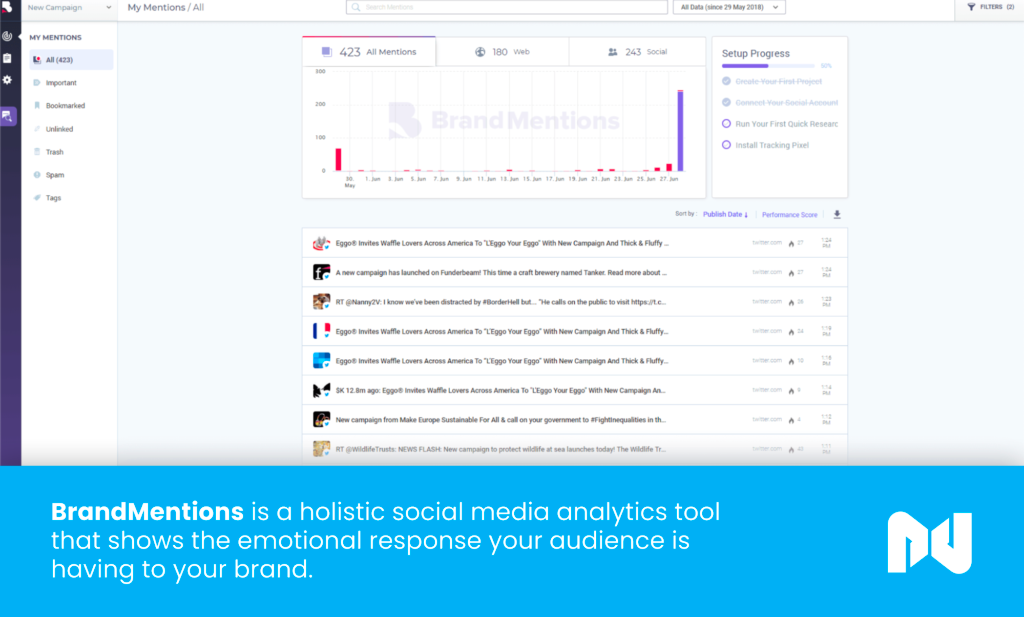
BrandMentions is unique compared to other social media analytics tools because of its holistic approach. While the service offers in-depth data tracking, the focus of BrandMentions is to track the emotional response your audience has to your brand.
This is perhaps most apparent with the “sentiment meter” which is a concise visual representation of how your audience sees your brand. Each impression from your customers affects this meter, and you can set alerts for when there’s a social media post that falls below a certain level on your sentiment meter. This allows you to have a more proactive hand in solidifying a positive reputation for your ecommerce business.
BrandMentions also lets you do “competitor spying.” In short, this means you can track your competitors on social media — almost like your competitors’ social accounts were your own. By tracking the social media presence of your competitors, you can see what they’re doing and most importantly, find ways to do it better. The idea is to help your business be more visible and garner stronger, more positive feedback.
As a social media analytics tool, BrandMentions is effective for businesses of any size. The biggest weakness of BrandMentions is the very minimal integration options. In fact, you’ll need a tool like Zapier to enable something as simple as real-time notifications.
Cost: Variable. Starts at $49 per-month with user and keyword limitations. Offers a 14-day free trial.
Ecommerce Analytics Tools
Ecommerce analytics tools help you track and increase sales online and grow your business. They give you insight into customer behavior from tracking products often left abandoned in shopping carts, to finding the most relevant products to upsell.
6. Crazy Egg
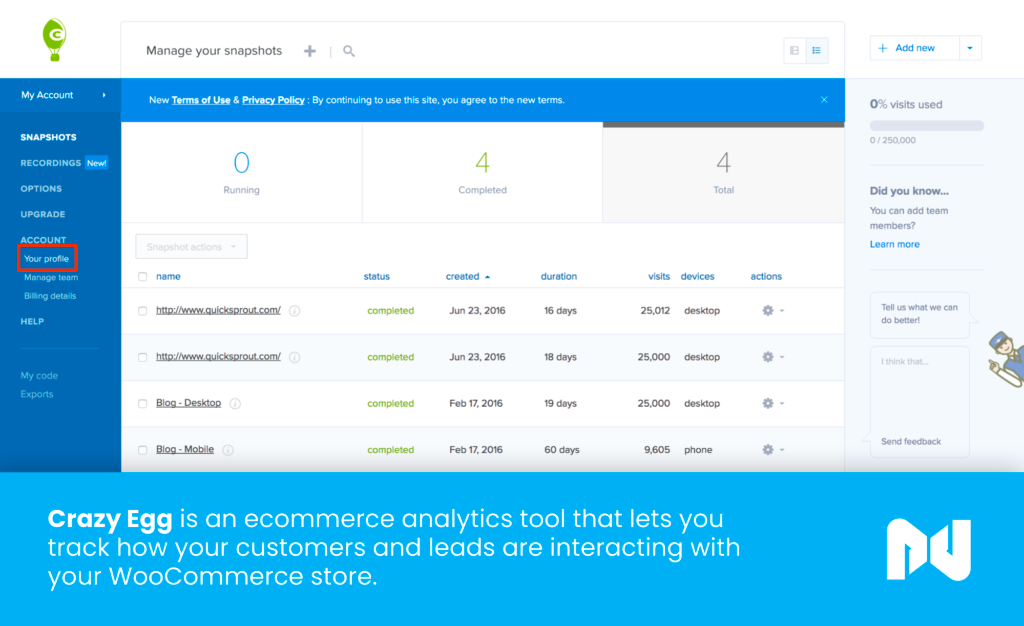
Crazy Egg is among the most popular data analytics tools for ecommerce. That’s because it has features that are useful for online retail businesses of any size.
Arguably the most notable of Crazy Egg’s features is its heatmap. It’s an invisible layer placed over your ecommerce store, offering a thermal visualization of the “warmer” parts of a page that get the most activity. A heatmap is a useful at-a-glance representation of how your customers are interacting with your ecommerce store. For instance, you can use a heatmap to find out whether your customers are seeing and responding to your call-to-action.
Aside from the heatmap, Crazy Egg offers robust A/B testing for your ecommerce store. This makes it very simple to test variants of landing or product listings so you can determine which generates the most sales. There’s even a user recording feature that does exactly what it sounds like. It creates “recordings” of each user’s experience that you can play back like a video.
Crazy Egg is an ideal choice if you’re looking for a tool to better understand how customers are interacting with your ecommerce store. In terms of integration, Crazy Egg supports WordPress, as well as Google Cloud services.
Cost: Variable. Starts at $24 per-month (billed annually) for 30,000 pageviews and 100 user recordings. Offers a 14-day free trial.
7. Glew.io
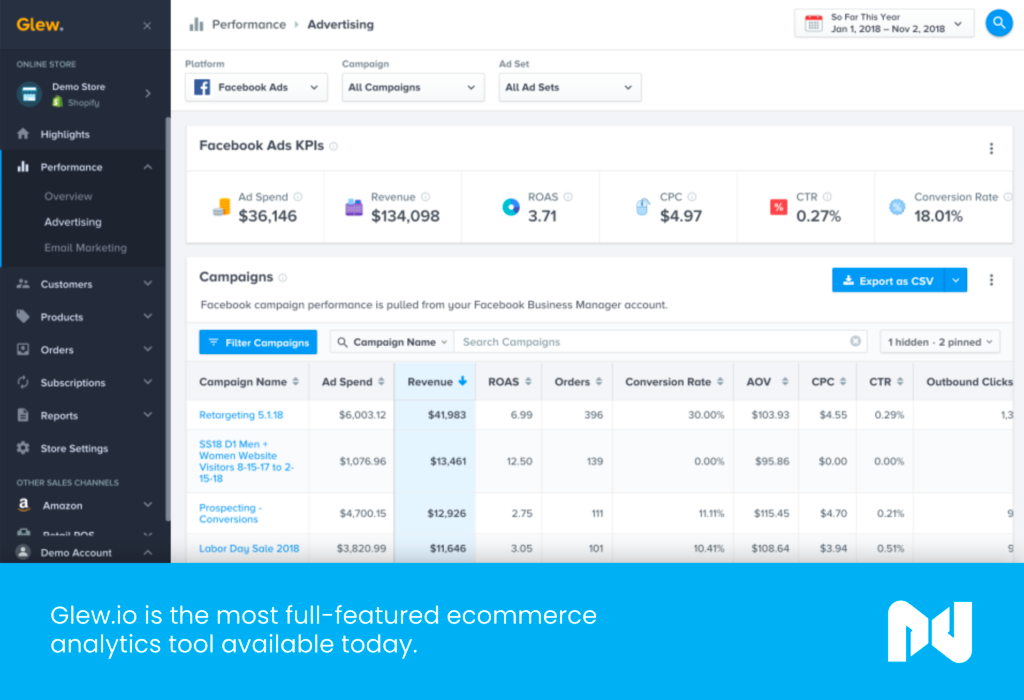
Whether you’re a multi-channel retailer or a humble online store, Glew.io is one of the best ecommerce analytics tools around. The platform has almost everything you could want: a familiar, WordPress-like interface with tons of reporting options, in-depth customer tracking, order management, and even financial data to complete the picture.
As an ecommerce analytics tool, Glew.io tracks many key product metrics and allows you to quickly distinguish top-selling products from those that generate the least profit, or products with the highest overhead from those with the lowest margins.
In short, Glew.io provides tons of useful, actionable insights to strengthen your ecommerce business. Additionally, it’s designed for multi-channel retail, meaning Glew.io tracks sales from each platform you use. It can also pull data from your Facebook Ads, Instagram Ads, and Google AdWords campaigns to give you a complete picture of your ecommerce store’s performance.
With more than 30 integrations for WooCommerce and other top platforms — including marketing automation, point-of-sale, shipping management, and enterprise resource planning tools — Glew.io is useful for ecommerce businesses of any size and revenue. Plus, there are more integrations being added regularly.
Cost: Variable. Starts at $169 per-month with a 36-month agreement. Offers a 10-day free trial.
Editor’s note: If you want to save some money and get a plethora of data at your fingertips you can signup for our Growth plan which includes Glew.io.
Use Ecommerce Analytics Tools That Help You Make Smarter Choices
There are a ton of different options for ecommerce analytics software. And while Google Analytics is a great place to get started, you won’t be able to answer all of the questions your business will have using that tool alone.
We think the most robust solution is one where you use several data analytics tools simultaneously. This is one of the many reasons why we include Glew.io in our Managed WooCommerce hosting.
Conclusion
Ultimately, you should use services that help you better understand your customers, gauge the success of your advertising campaigns, and generally make smarter choices for your business.
If you’re looking for an easy way to start an ecommerce business, StoreBuilder by Nexcess allows you to reap all the benefit of our Managed WordPress and WooCommerce without the complexity.
No coding experience? No problem.
There’s no reason to start from scratch or feel overwhelmed by a blank screen. Just answer a few questions, and in minutes, you’ll have your own online store with an intuitive, easy-to-navigate homepage that’s optimized to convert your visitors to customers. Check it out!
